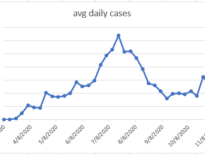
Photo credit: pxhere.com, public domain.
What’s happening now?
In LA County, COVID-19 cases, deaths, and hospitalizations have been steadily declining for the last two months. Hospitalizations and deaths from COVID-19 in LA are at lows not seen since the early months of the pandemic. This contrasts with a recent increase in cases nationally, including in cities like New York. Whether this new resurgence of cases will spill into Los Angeles remains to be seen.
What can we do to keep the numbers here improving? Continuing to do what we’re doing is clearly working, but with many suffering from “pandemic fatigue”, I thought it might be helpful to review how COVID-19 spreads so we can focus our efforts on what works.
How is COVID-19 transmitted?
A very useful review of what we know about COVID-19 transmission was published in the Annals of Internal Medicine two weeks ago. The review stressed that this virus is transmitted through respiration, that is through someone inhaling a particle recently exhaled by someone else. Physical proximity and ventilation are major determinants of transmission risk. That’s why many clusters of transmission happen in crowds, and most clusters of transmission happen inside. So physical distancing helps reduce risk, and gathering outside rather than inside helps reduce risk. Studies also suggest that wearing a mask, both in health care settings and in general, decreases the risk of transmission.
A poorly known but important conclusion of this review is that transmission of COVID through contact of surfaces not been conclusively documented. When the pandemic began, since we didn’t know how the virus was transmitted, many people took it on themselves to disinfect packages, clean doorknobs in their house, and generally treat all surfaces as if laden with cooties. After studying many transmission clusters over all the months of the pandemic, we can confidently conclude that the virus isn’t usually spread that way.
In July, The Atlantic published an interesting article reviewing the “hygiene theater” (decontamination for good PR, rather than for health) that developed during the pandemic even as it became clear that surfaces were not a threat. It also made the good point that resources devoted to disinfecting surfaces (for example on subways) are depleting resources better devoted elsewhere (for example, by letting subway cars run for more hours instead of being cleaned daily). I’m hoping that alleviating anxieties about this issue will conserve our physical and emotional energy to concentrate on what works in the coming months – physical distance, ventilation, masks.
So as a gift to yourself, please stop cleaning your packages, stop Windexing your produce, and lose the gloves. Handing someone a credit card, touching an elevator button, or opening a door might transmit Staph or lots of other germs, but it’s unlikely to transmit the novel coronavirus. It’s OK to use your bank teller’s pen to sign something. (But, according to my local branch, it’s not OK to absentmindedly insert it into one’s nose. Another reason to wear a mask.)
Yes, between patient visits we’re still meticulously cleaning surfaces in our examination rooms. But that’s because (1) we have low enough patient traffic to do the extra work, (2) we are intentionally being more cautious than necessary, and (3) we want to reassure patients who are simply frightened, regardless of the data. That is, we don’t only want patients to be safe; we also want them to feel safe.
A personal note
With Yom Kippur hours away, I wanted to acknowledge what an awful year many of us are having. Some of my patients have lost thriving businesses. Many of us had healthy habits which were carefully constructed over years to keep us physically and mentally fit. These habits toppled overnight, and are hard to recreate. Many of us miss seeing our grandkids or our parents in person. We are more isolated, more frightened, and less optimistic than we’ve ever been. None of us are at our best.
So for all the times I was cranky when I should have been calm, for all the times I spoke when I should have listened, for all the times I tried to explain how you should think before understanding how you feel, for all the times I was short when I should have been patient, I sincerely apologize. Please forgive me. I’m confident there are better days ahead. We must remember that in life (unlike math) truth is frequently self-contradictory. We are all doing the best we can; we can all do better.
Learn more:
LA County Daily COVID-19 Data (LA County Dept of Public Health)
Transmission of SARS-CoV-2: A Review of Viral, Host, and Environmental Factors (Annals of Internal Medicine)
Hygiene Theater Is a Huge Waste of Time (The Atlantic, July 27)
